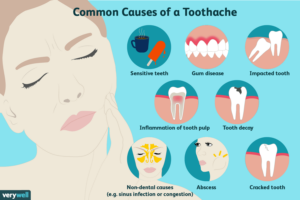
A toothache can be caused by anything from a popcorn hull stuck in your gum to a broken tooth or a bacterial infection. Some toothaches may come from temporary gum irritation But serious toothaches need treatment by a dental professional to resolve the pain and whatever problem is causing it.
What is a toothache?
A toothache is a pain in or around a tooth. Minor toothaches can come from a temporary gum irritation that you can treat at home. More serious toothaches are caused by dental and mouth problems that won’t get better on their own and will need to be treated by a dentist.
Why is my toothache so painful?
The pulp inside your tooth is soft material filled with nerves, tissues and blood vessels. These pulp nerves are among the most sensitive in your body. When these nerves are irritated or infected by bacteria (abscess), they can cause severe pain.
What are possible causes of toothache?
Toothaches can be caused by:
- Tooth decay.
- Abscessed tooth (a bacterial infection inside the center of the tooth).
- Tooth fracture (broken tooth).
- A damaged filling.
- Repetitive motions, such as chewing gum or grinding or clenching teeth and these motions can wear down your teeth.
- Infected gums.
- Eruption (teeth coming out of the gums) or removal of a tooth (for example, wisdom teeth).
What are symptoms of toothache?
- Tooth pain that may be sharp, throbbing, or constant. In some people, pain results only when pressure is applied to the tooth (biting down on something).
- Swelling around the tooth.
- Fever or headache.
- Foul-tasting drainage from the infected tooth.
- A bad odor from the mouth.
If you experience trouble breathing and swallowing along with your pain, call a dental professional right away.
Can my toothache go away on its own?
Some toothaches that come from pain around (but not inside) your tooth can get better without a trip to the dentist. Pain from a temporary irritation (redness) in the gum can be resolved within a few days. During this time try not to chew around the affected area. Eat soft foods, like eggs and yogurt, and avoid sweets and very hot or very cold foods if teeth are sensitive.
How do I treat a toothache at home?
For temporary relief of a toothache, you can do the following:
- Rinse with warm saltwater. Saltwater can loosen debris between your teeth, act as a disinfectant and reduce inflammation. Stir a ½ teaspoon of salt into a glass of warm water and rinse your mouth thoroughly.
- Cold compress. For swelling and pain hold a cold compress of ice wrapped in a towel to the painful area for 20-minute periods. Repeat every few hours.
- Pain medications. Over-the-counter pain medications can reduce pain. But try to call your dentist as soon as possible.
What happens when I go to the dentist’s office for my toothache?
At the office your dental team will review your medical history. You’ll be asked questions like:
- Where is the pain located?
- When did it start?
- How severe is it?
- What makes the pain worse and what gives you relief?
The dental team will also do a physical exam. They’ll check your mouth, teeth, gums, jaws, tongue, throat, sinuses, ears, nose and neck. You’ll probably get X-rays of your mouth taken to help show the cause of your toothache.
How will the dentist treat?
Treatment by a dental professional depends on what is causing your toothache.
- If a cavity is causing the toothache, your dentist will fill the cavity or take the tooth out, if necessary.
- A root canal (a procedure to remove and replace infected pulp with sealing material) may be needed if the cause of the toothache is an infection of the tooth’s nerve. Bacteria that have worked their way into the inner space of the root of the tooth cause infection.
- The doctor may prescribe an antibiotic if the patient has a fever or swelling in the jaw. A small piece of food, such as a popcorn hull, can get stuck under the gums and cause an infection. In this case, the dentist may perform or recommend a deep cleaning, followed by further periodontal (gum) therapy if necessary
How can I prevent a toothache?
Since most toothaches are the result of tooth decay, good oral hygiene practices can prevent toothaches.
- Brush regularly with a fluoride toothpaste.
- Floss at least once a day.
- See your dentist twice a year for professional cleaning.
Also, eat foods low in sugar and ask your dentist about sealants and fluoride applications.
When should I see a dentist ?
See your dentist as soon as possible if:
- You have a toothache that lasts longer than one or two days
- Your toothache is severe.
- You have a fever, earache or pain when you open your mouth wide.
- You experience swelling in the mouth or face.
Toothaches can be extremely uncomfortable but the pain isn’t permanent as long as it’s treated. Your dental professional can relieve your pain and prevent any infections in your mouth from spreading in your body.
Can a toothache make me sick, or even be fatal?
A toothache itself isn’t fatal. But an untreated infection in your tooth (or any other part of your body) can spread So if you toothache isn’t getting better it’s a good idea to contact your dentist.
